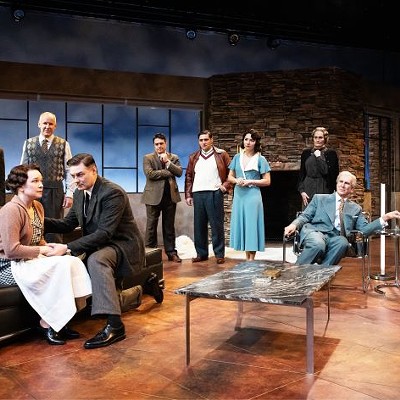Support Us
Houston's independent source of
local news and culture
account
- Welcome,
Insider - Login
- My Account
- My Newsletters
- Contribute
- Contact Us
- Sign out
Creatively Ambitious Describe The Night Plays for Thrills Instead of Engagement
Jessica Goldman September 28, 2017 8:52AM

Todd Waite and Jeffery Bean a in Alley Theatre’s World Premiere of Describe the Night by Rajiv Joseph
Photo by Lynn Lane
[
{
"name": "Related Stories / Support Us Combo",
"component": "11591218",
"insertPoint": "4",
"requiredCountToDisplay": "4"
},{
"name": "Air - Billboard - Inline Content",
"component": "11591214",
"insertPoint": "2/3",
"requiredCountToDisplay": "7"
},{
"name": "R1 - Beta - Mobile Only",
"component": "12287027",
"insertPoint": "8",
"requiredCountToDisplay": "8"
},{
"name": "Air - MediumRectangle - Inline Content - Mobile Display Size 2",
"component": "11591215",
"insertPoint": "12",
"requiredCountToDisplay": "12"
},{
"name": "Air - MediumRectangle - Inline Content - Mobile Display Size 2",
"component": "11591215",
"insertPoint": "4th",
"startingPoint": "16",
"requiredCountToDisplay": "12"
}
,{
"name": "RevContent - In Article",
"component": "12527128",
"insertPoint": "3/5",
"requiredCountToDisplay": "5"
}
]
The great Russian writer Isaac Babel tells subversive lies for a living. Only he wouldn’t call them lies; they’re simply stories he makes up as part of his work writing books, poems and screenplays. Soviet Secret Police Chief Nikolai Yezhov also tells lies. To himself about his war atrocities, in service of Stalin’s purge of suspected political enemies and in an attempt to hold onto what little power he has left once he too falls out of favor.
Potentially the biggest lie of them all is the notion that the 2010 fatal plane crash of a flight traveling from Poland to Russia, killing all the top members of the Polish government and military, was merely an unfortunate accident. An accident not in any way orchestrated by Russia under Vladimir Putin’s rule.
These lies, their genesis, their implications and their aftershocks form the interconnected, three-act, three-hour narrative web in Rajiv Joseph’s epically ambitious, imaginatively historical, fantasy-infused, mysteriously thrilling yet soulless new play, Describe the Night.
There is no doubt much to celebrate in the debut of this show, which was inspired by Joseph's love of Babel's work and commissioned by the Alley Theatre. As with his Pulitzer finalist play, Bengal Tiger at the Baghdad Zoo, Joseph has found an unexpectedly creative way to give us a historical play that's free of the kind of factual dogma and naturalistic constraints that weigh these kinds of narratives down in details and drudgery. License is taken, and it’s taken to wondrous effect at times. I dare anyone to say yes to a bowl of Eastern European soup again without understanding the full ingredient list.
Plus there is great celebration in the simple fact that this production is being staged at all. Hurricane Harvey’s destruction of the Alley’s Neuhaus stage forced the show to relocate last minute into the much smaller University of Houston Quintero Theatre. Despite the cast still projecting as if they’re playing to a much larger audience (eardrums folks), Director Giovanna Sardelli and her creative team have made the transition seem effortless.
So then what is there to be disappointed in?
Joseph sets his play over nine decades, moving back and forth between times during the three acts. Dates and/or narrative emotions such as Blood and Freedom are flashed in surtitle fashion above the stage announcing the scene we are about to see. 1920 introduces us to Isaac and Nikolai, who meet during the Polish-Soviet war. A scene titled Fate presents us with Nikolai’s wife, Yevgenia, who foretells the future and is soon to be Isaac's lover. We get pre-Stalin-purge insight into Nikolai and Isaac’s relationship, followed by what becomes of that closeness, and Isaac, once the hammer and sickle comes down. During Escape, we meet Urzula, Yevgenia’s daughter, as she contemplates a plan to leave East Germany. 1989 brings us to glasnost, the fall of the Berlin Wall and the end of Nikolai’s lingering power. In 2010 we meet a reporter and a car rental agent, witnesses to the Polish plane crash. And then, of course, there is Vova, a KGB agent destined to become the most powerful man in the world. Or at least in Russia. We never see him take off his shirt or condemn Pussy Riot – but we all know who he is.
Seven men and women, all tied up in this whirlwind epic plot, and yet we don’t relate to, empathize with, root for or really feel for any one of them. They are puzzle pieces moving about, on whom we wait with some excitement, wanting to know how the whole thing ties together. But mystery aside and with an anticipation of collective sense, these are characters that leave us lukewarm to varying degrees.
Then there’s the problem with how their stories overlap. For those still eye-rolling for days about Crash, the 2004 Oscar-winning movie that ramped coincidental character intersection up to 11, or 1998’s The Red Violin, which took an object’s ownership over years to ridiculous extremes, Describe the Night will cause nervous tics. Yes, some of Joseph’s narrative is true (as the post-show fact sheet handed out will confirm). But the extent to which he goes to make sure 90 years of characters have not just a casual connection but perfect integration, hermetically sealed and with a bow on top, feels overly forced. Everybody is connected miraculously in perfect daytime-soap-opera fashion. That a diary written by Isaac in the 1920s should change hands so many times that, remarkably, it ends up in the lap of the leader of the country in 2010 is neater than Martha Stewart’s spice pantry.
But perhaps the biggest problem with the production is the portrayal of Nikolai. With such heady historic events, it serves the play well that Joseph injects some levity into the show. But playing it for yuks, as Todd Waite as Nikolai does again and again in this role, seems so out of step with the production that it unhinges the traction we’re trying to maintain. Perhaps it’s funny to some to have Stalin’s most trusted guard dog be so clueless and dense. Maybe some find it funny that as an elderly man he’s dressed up like Father Time with a long white beard and a tattered coat, shuffling in a Tim Conway manner and waving jazz hands to punctuate his gag lines. But I’m not sure those people are the same folks either Sardelli or Joseph is trying to reach with his show.
Still, problems acknowledged, there are some notably brilliant moments to be enjoyed. Jeffrey Bean as Isaac Babel thrills with his deliciously wordy but lithe performance. New to the Alley, Liv Rooth as Yevgenia impresses as she morphs from sultry-voiced, young and vibrant woman to old, frail and mentally compromised 90-year-old. Jason Babinsky, also new to the Alley, shows spine-tingling coolness in his portrayal of an up-and-coming and, later, established Putin. Most surprisingly, Elizabeth Bunch uses her immense talent to utterly disappear into a character in the final scenes of the play, showing that she’s more than ready to take on challenging supporting roles.
Much has been said about the soothsaying abilities Joseph displayed in writing a play that delves into Russian meddling, cover-up and conspiracy just before the whole nasty U.S. election hacking scandal broke in our country. How on the nose, people say, to have this play at exactly this time. And sure, there is a kind of confluence of news items with themes in Joseph’s narrative. But to say that this is a play in tune with or reflecting our times is to cheapen Joseph’s work. It’s a good marketing hook, no question, but it misses the point.
The message control, the media censorship, the punishment of the disloyal, the bad deeds swept under the carpet, these are not new leitmotifs in stories about the Soviet Union or modern Russia. As Joseph shows us via Isaac Babel’s story, these are refrains that date back to long before our most recent distrust of the Russian regime.
Joseph was neither trying to crystal-ball our present time nor necessarily firing a shake-in-your-boots-and-beware warning shot for the future. He was contemplating events in history and wrote a play about it. An interesting, at times entertaining and creative play that resides too much in the head and not enough in the heart. But give the man credit; he did this all out of personal interest, not reactionary newsflash coattails.
Present-day events aside, Describe the Night would succeed and fail on the same issues. Joseph has not written himself into a “moment”; he’s given us a story that makes sense no matter the climate. If only it could make us feel as well as think.
Describe the Night runs through October 15 at the University of Houston’s Quintero Theatre. 3351 Cullen. For information, visit alleytheatre.org. $35-$75.
KEEP THE HOUSTON PRESS FREE...
Since we started the Houston Press, it has been defined as the free, independent voice of Houston, and we'd like to keep it that way. With local media under siege, it's more important than ever for us to rally support behind funding our local journalism. You can help by participating in our "I Support" program, allowing us to keep offering readers access to our incisive coverage of local news, food and culture with no paywalls.
Jessica Goldman was the theater critic for CBC Radio in Calgary prior to joining the Houston Press team. Her work has also appeared in American Theatre Magazine, Globe and Mail and Alberta Views. Jessica is a member of the American Theatre Critics Association.
Contact:
Jessica Goldman
Trending Arts & Culture
- Reviews For The Easily Distracted:
Deadpool & Wolverine - And Then There Were None at the Alley Leaves You Guessing Till the Very End
- Theater Magic: The Wizard of Oz at Queensbury Theatre
-
Sponsored Content From: [%sponsoredBy%]
[%title%]

Don't Miss Out
SIGN UP for the latest
arts & culture
news, free stuff and more!
Become a member to support the independent voice of Houston
and help keep the future of the Houston Press FREE
Use of this website constitutes acceptance of our
terms of use,
our cookies policy, and our
privacy policy
The Houston Press may earn a portion of sales from products & services purchased through links on our site from our
affiliate partners.
©2024
Houston Press, LP. All rights reserved.





